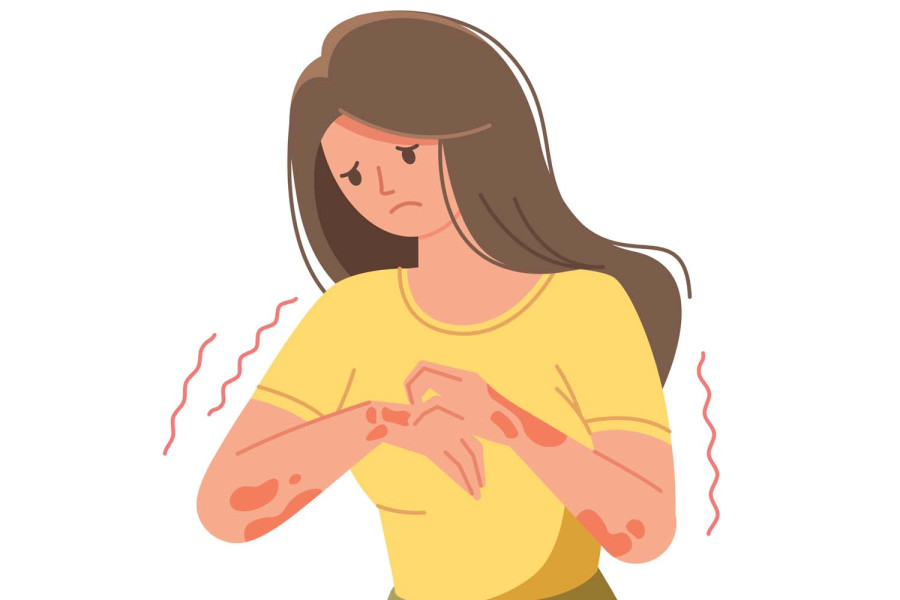Culture & Lifestyle
Unpacking skin-picking disorder
Excoriation disorder is a mental health condition where individuals feel compelled to pick at their skin. Pratistha Ghimire discusses its causes, consequences and treatment options.
Rishika Dhakal
Excoriation disorder, more commonly known as dermatillomania, is a mental disorder on the obsessive-compulsive spectrum that is characterised by the repeated urge or impulse to pick at one's skin to the extent that either psychological or physical damage is caused.
Pratistha Ghimire, a consultant psychiatrist at Paropakar Maternity and Women’s Hospital, explains Skin Picking Disorder (SPD).
What is excoriation (skin-picking) disorder, and how does it differ from common skin-picking behaviours?
Skin picking disorder (SPD) is characterised by recurrent skin picking resulting in skin lesions. Individuals with SPD may want to reduce or stop this behaviour but cannot do so. It was first described by French dermatologist Louis Brocq, who noted skin picking in young women with ‘acne excoriee’(a condition where people pick at acne spots until they create open sores). It differs from common skin-picking behaviour because SPD is associated with clinically significant impairment or distress.
What are some of the common causes or triggers for this disorder?
Skin-Picking disorder has many triggers, and people often experience several at once. Stress, anxiety, time away from scheduled activities (for example, sitting on the couch, watching television, reading, and so on), boredom, and feeling tired or angry have all been reported as triggers. Difficulty in regulating emotions can increase the likelihood of picking behaviours, especially when experiencing high emotional reactivity. For some, the feel of the skin (such as a bump or roughness) or appearance (like a blemish or discolouration) can lead to picking.
From a cognitive-affective neuroscience perspective, SPD shares features with Obsessive-Compulsive disorder (OCD), including impulsive motor impulsivity. Brain imaging studies have suggested that specific brain circuits, like the cortico-striato-thalamo-cortical (CSTC) pathway, may play a role, though other areas may also be involved. However, studies conducted on family and twins provide a genetic predisposition to SPD, further connecting it to OCD traits.
What are the physical consequences of excoriation disorder on the skin and overall health?
Many individuals with skin picking disorder begin picking at the onset of a dermatological condition such as acne, but the picking continues even after the dermatological condition clears. Although the face is the most commonly reported site of picking, other areas, such as the hands, fingers, torso, arms, and legs, are also common targets.

In a study of 60 individuals with skin-picking disorder, respondents reported picking an average of 4.5 different areas on their body. For most individuals with skin picking disorder, various picking lesions can be seen, ranging from a few to hundreds. Although most individuals pick at areas they can reach with their fingernails; many reports show using knives, tweezers, pins, and other objects to pick their skin.
Picking may result in significant tissue damage and often leads to medical complications such as localised infections and septicemia. Patients are often too ashamed to report areas that have become infected or where picking is particularly severe. A thorough physical examination is often needed to assess the extent and severity of picking accurately.
How does skin-picking serve as a coping mechanism for individuals?
Some psychologists believe that skin-picking behaviour can be a result of an individual's repressed rage toward their authoritarian or overbearing parents, with picking providing a physical outlet for these otherwise suppressed feelings.
What treatment options are available for individuals with excoriation disorder?
Treatment for skin picking disorder has primarily focused on Cognitive-behavioural therapy (CBT) and medication. Cognitive-behavioural therapy includes treatment such as Habit reversal, where individuals become more aware of their picking behaviour and replace it with less harmful actions, like clenching their fists or engaging in a different activity when they feel the urge to pick.
At the same time, acceptance-enhanced behaviour therapy helps individuals accept difficult thoughts or emotions without acting on the urge to pick. This therapy focuses on reducing the emotional triggers behind picking and developing healthy coping mechanisms. Medication includes Serotonin reuptake inhibitors (SSRIs), N-acetylcys—teine(NAC), or Naltrexone. The choice of medication depends on co-occurring disorders and patient history.
For family and friends, what is the best way to support someone who struggles with compulsive skin-picking without making them feel ashamed or judged?
Family and friends should listen to the person suffering from SPD without making judgements and concentrate on their needs at that moment. Ask what would help them, reassure them, and offer practical information or resources.
Similarly, avoiding confrontation, asking if there is someone they would like you to contact and encouraging them to seek appropriate professional help can be a great help. In cases where the patients have hurt themselves, one needs to ensure they receive the necessary assistance.
Experiencing things others don't like seeing or believing things others may not can indicate a mental health issue. Instead of reinforcing or dismissing these experiences, acknowledge how such symptoms make the person feel.




 14.24°C Kathmandu
14.24°C Kathmandu



.jpg&w=200&height=120)











